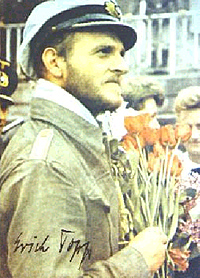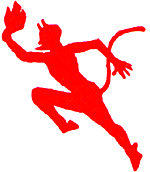Interview with Adm. Erich Topp Part 1
Interview with Adm. Erich Topp Part 2
 This is the 1994 interview we did with Admiral TOPP, and it is the first time it is published anywhere. You may order a copy of this on videotape. Details on our website.
This is the 1994 interview we did with Admiral TOPP, and it is the first time it is published anywhere. You may order a copy of this on videotape. Details on our website.
Admiral TOPP: Well, anyhow – you were asking me what was my feeling when I went on board the landing ship dock in San Diego. I was picked up by a boat that took me to the ship and I was received with the normal ceremony and the Captain was, at the beginning, very cool and discreet, and we were sitting together in his Captain’s cabin. I didn’t know until he told me, that he had been an officer on board the USS NIBLACK that had taken over the rescue actions for the USS REUBEN JAMES and that on board of the USS REUBEN JAMES was his best friend.
Everybody knows what means ‘best friend’ in the American English. One knows how close they were, he and his friend. He tried to find him in the debris and the chaos – but he didn’t. It was a great loss and he wanted to know the man who had caused this loss. Well, I think when we left each other, when he had told me the details of the rescue action; we left each other with the conviction that you cannot evade your fate. My fate at that time was that I was the commanding officer of a submarine and I had to destroy the enemy – his task, his mission was to save the convoy and when it comes to an action, well there are losses. That is war and we can try, especially today with these horrible weapons, we can try to evade any kind of war and solve the questions by diplomatic channels and when you look at the world today, you see Yugoslavia and you see Rwanda, and wherever you look on the globe, you see that people are fighting against each other. Nevertheless, it is our vision to do everything possible to try to at least, reduce this horrible fighting. That is what I have to say about it.
SHARKHUNTERS: You describe in your book, how each devil is holding a different torch.
Admiral TOPP: I took over the Type II boat from another Commanding Officer, Kapitänleutnant Korth, and he already had on his tower – he had these two red devils dancing with each holding a torch in his hand, and one was the torch of life – for us to survive, and the other was the torch of destruction.
When I took over the next boat when I lost my boat U-57, not by enemy action but after coming back after a very, very difficult war patrol, we came back to Germany and we wanted to enter the Kiel Canal but then the lock was opened and a Norwegian ship came out. the ship was the SS RONA--ed.
 We had lights on and so he could see us. Nevertheless, he turned right to us and we were very reduced in our speed because, during the war patrol, one diesel was broken and we were very, very limited in our speed. So I could not evade and so it came to a collision, and as a consequence of that collision, my boat was sinking and we lost six men of the crew. So the emblem of the red devils – we should have three red devils and not only two. But, I could say the torch of destruction did ourselves at this moment.
We had lights on and so he could see us. Nevertheless, he turned right to us and we were very reduced in our speed because, during the war patrol, one diesel was broken and we were very, very limited in our speed. So I could not evade and so it came to a collision, and as a consequence of that collision, my boat was sinking and we lost six men of the crew. So the emblem of the red devils – we should have three red devils and not only two. But, I could say the torch of destruction did ourselves at this moment.
Even when I took over my next boat, U-2513 okay, the two devils again were on the boat. Every boat had an emblem – it was the custom at that time.
SHARKHUNTERS: You talked so much about the brutality of the war – were there any moments when you were on patrol when there was comedy, a moment of humor, something that was funny in contrast? Some soldiers remember that, in the midst of a war, something happens to make them laugh. Were there any times like that on your boat?
Admiral TOPP: I am not able to remember that there was any humor or any funny stories.
SHARKHUNTERS: Did you play tricks on each other, or make jokes with one another?
Admiral TOPP: I did not joke with the crew. Of course, when we had people like you (journalists) on board, we had some jokes. I remember one time, it was in St. Nazaire, we had to test the boat outside of the harbor and we went to sea with the boat, accompanied by a minesweeper. We had a few journalists on board and one of them was, let me say, he seemed to know everything and he was talking as if war at sea was to him, but nothing serious. Well, in our minds, he did a little bit overdo himself and so we wanted to try him in a dangerous moment. So we went out and he was in the control room and I was on the bridge, and I gave the ALARM signal. ALARM! And I went down, but the watch officer stayed on the bridge. We were diving, but we were keeping the boat at a certain angle to make it seem as if we were diving. Then we had prepared hand grenades and the watch officer threw them into the water and there was a big blow, and I said that we were being attacked by British air. Then we made photos of this man when he became very pale and was trembling, and he had not the force that he had shown before! So we sent him later, these photos in memory of his, or his “war patrol” that he was participating in. That was a curious, funny thing but I cannot remember anything that was curious or was funny. It was very strict and we were always………….well, I cannot give an answer to that.
SHARKHUNTERS: Can you tell us of the time when you were most frightened? Or the moment your were proudest of?
Admiral TOPP: The most frightened – I don’t know what you mean by the most frightened. When you understand under fright and then you get a shock and then you get out of control, so I must say that I have never been frightened during war actions. I don’t know that – I was always ready to react at once and there was no time to get frightened. If you ask me about during my life if I was frightened, I once was frightened very much when I heard that my grandchild became cancer of the skin and nobody was able to give an answer, then I was frightened. To be reshocked and to have no answer for it, then I know what it is to be frightened but on board, I never have had this feeling to get frightened.
SHARKHUNTERS: How about worried – were there times when you were very worried about the fate of your boat and your crew? Or were you just reacting professionally?
Admiral TOPP: I think, of course, when you get depth charges, as I already said, you don’t know what is the result. You try to evade, you try to get a depth where you are safe – but you never know what the other side is doing and therefore, depth charges are a question with a great question mark and therefore you don’t know how to answer it. As I said before, you have to keep your face that the crew – because the crew is trying to read on your face what is going on now, and you should not show that you yourself have a question mark in your mind.
SHARKHUNTERS: Admiral, you were in operations as a Skipper for some time. As the war progressed, say from 1940 to 1942, did you notice any increase in the skills of your opponent?
Admiral TOPP: Well, I don’t believe there were any increase in the skills but what changed considerably were the tools and the weapons of the ASW measurement of the other side. I begin with the radar, minimized for airplanes with a radius of ninety miles, with a certain number of planes they could have surveillance of the whole Atlantic.
That was the first. Then there was a group of twenty-four depth charges with contact detonators. (He refers to hedgehogs). Then another thing was – well of course, very important was Huff Duff, the high frequency direction finder with the ability to pin point a submarine that was giving signals up to twenty-five miles. And the increasing number of escorts, hunter killer groups with aircraft and so on and so on. of course, breaking the code and all these things but the main difference was that the British made something that, well let me say – Bletchley Park. There they had a close cooperation between military men and scientific men. They had the advantage that German scientists, Polish scientists, Jewish scientists contributed together but on our side, when we compare it with what we did, we had nothing.
This first-person memory of World War II will continue next month in KTB #174, but you may order the entire videotape right now. Ask for Videotape H-50, the 1994 interview with Konter Admiral Erich Topp. Send $30 for each tape plus $5 shipping, and the tape will be sent right out to you.
More Adm. Topp
- Interview with Adm. Erich Topp Part 1
Interview with Adm. Erich Topp Part 2
Interview with Adm. Erich Topp Part 3
Interview with Adm. Erich Topp Part 4
Interview with Adm. Erich Topp Part 5
Interview with Adm. Erich Topp Part 6
Back to KTB # 173 Table of Contents
Back to KTB List of Issues
Back to MagWeb Master Magazine List
© Copyright 2004 by Harry Cooper, Sharkhunters International, Inc.
This article appears in MagWeb.com (Magazine Web) on the Internet World Wide Web. Other articles from military history and related magazines are available at http://www.magweb.com
Join Sharkhunters International, Inc.: PO Box 1539, Hernando, FL 34442, ph: 352-637-2917, fax: 352-637-6289, www.sharkhunters.com
